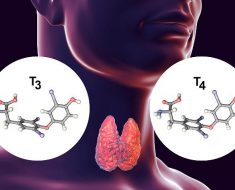
Sarcoidosis is a disease in which nodules of immune cells form, primarily in the lungs but also in the skin or in the heart. While the lung symptoms are similar to those of tuberculosis, the etiology of the disease is unknown. It is currently assumed that causation is multifactorial, whereby certain environmental impacts and bacterial pathogens trigger sarcoidosis in genetically predisposed individuals. For example, there was a rise in the number of cases of sarcoidosis among firemen who were deployed during 9/11, due to the enormous dust burden to which they were exposed. Also, the bacterium responsible for causing acne is found in the pulmonary granulomas of many patients.
Working with their colleagues Alain Calender and Yves Pacheco from Lyon, a research team led by Clarice Lim and Thomas Weichhart has now identified a genetic component that is involved in development of the disease. By conducting a genome analysis of families in which there are clusters of sarcoidosis, the study, which was published in the European Respiratory Journal, shows that the metabolic sensor mTOR plays a central role in the pathogenesis of sarcoidosis. In addition to this, the exome, which is the coded portion of the genome, of 22 people from 5 families was sequenced.
Says Weichhart: “The unique thing about the study design was that it allowed us to analyse patients and their unaffected siblings over three generations in some families. In this way we were able to identify mutations that were passed on exclusively to patients but not to their healthy relatives.” Following detailed bioinformatic analysis, it was found that many mutations relate to genes that normally deactivate the metabolic sensor mTOR. Lead author Clarice Lim explains: “The mutations then result in mTOR being more active, so that these nodules, so-called granulomas, are more readily able to form.”
Thomas Weichhart’s working group had already demonstrated in an animal model that the activation of mTOR in immune cells is sufficient to cause sarcoid granulomas to form. The new data now show that, on a genetic level as well, mTOR contributes to the development of sarcoidosis in patients.
Georg Stary from MedUni Vienna’s Department of Dermatology is currently conducting a clinical trial to test a therapeutic application of this relationship. A study funded by the Vienna Science and Technology Fund (WWTF) is to investigate the efficacy of the mTOR inhibitor Sirolimus in sarcoidosis patients with skin and pulmonary involvement. Sarcoidosis patients are still being sought for this clinical trial. See references for further information.
Source: Read Full Article





